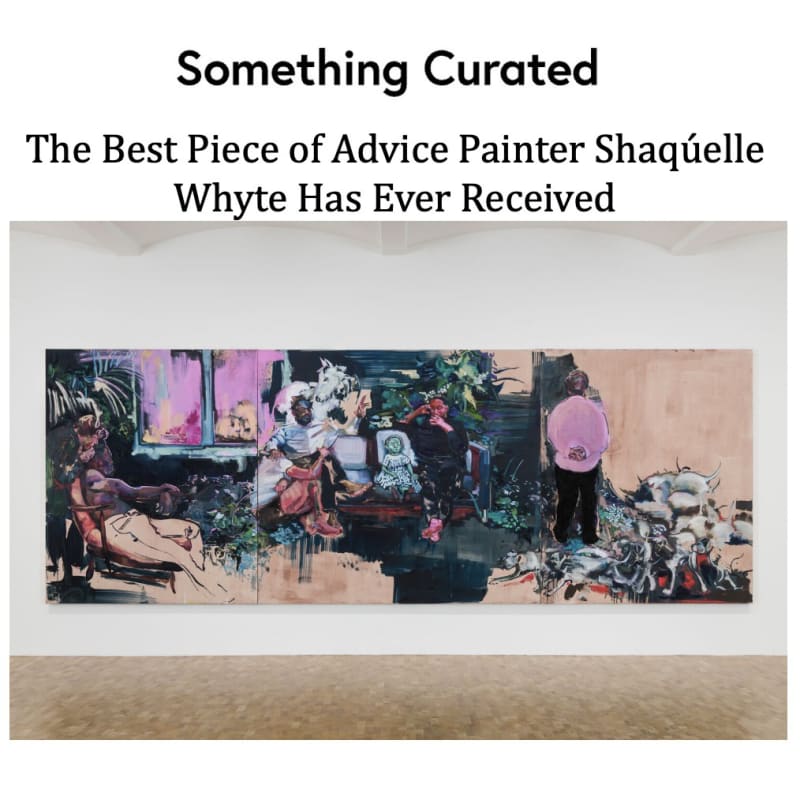Following his graduation from the Royal College of Art just last year, London based artist Shaqúelle Whyte's career is on a rapid upward trajectory. His work was included in Hauser & Wirth's major group exhibition, Present Tense, which ran until the end of April, and now he has a solo show open at Pippy Houldsworth Gallery. Titled Yute, you're gonna be fine, the presentation brings together a new series of paintings that interrogate the human condition.
The subjects of Whyte's canvases are at once enigmatic and familiar, serving as conduits for the artist's subconscious - he fosters a sense of introspection through his figures' often averted faces and concealed expressions. Characterised by vigorous, fluid brushstrokes and an expansive approach to composition, his paintings resist linear understandings of time. To learn more about Whyte's work, Something Curated spoke with the artist.
Keshav Anand: There is a sense of theatre that permeates your paintings - how do you approach storytelling within your practice?
Shaqúelle Whyte: I approach storytelling from various angles. It often begins with a lot of research in the studio. This involves reading both literary fiction and artist monographs, doing my own writing, and also drawing. Through these processes I find that I can start to layout my initial plans for the canvas.
This practice, intercepted by my daily life, allows for a conjuring of a plethora of ideas - which play into the idea of theatre. However this all becomes almost mute once I approach the canvas and start to enact the ideas that I have collated. More often than not the canvas will tell you what it needs and take you on a journey of expression.
This is where theatre resides in painting and as such, creates an oscillating hierarchy between the materiality of paint, aesthetics and storytelling. This underpins the painting and allows for different facets of theatre to appear in the works.
KA: Animals appear in many of the works at your current Pippy Houldsworth Gallery show. I'm curious, what is the thinking behind their inclusion?
SW: I find that the figures in the pieces I make are not concerned with the viewer. Neither am I during the making of the work. The world in which they live in is their own - it's not our world, but neither does it submit to the ideas predefined for figurative painting to operate. It's for this reason that I find the use of animals interesting as a device in painting.
They offer a perspective from within the paintings, aware of the effect that the action of the composition is having on the viewer. They are not only concerned with the goings on in the painting but also, what exists outside of the canvas. They can move through the works in ways that human bodies cannot, giving a broader perspective on the action taking place.
KA: What's the best piece of advice you've ever received?
SW: The best piece of advice was given to me by Michael Armitage while I was in my second year of Slade. I was fortunate enough to have a tutorial with him, facilitated by my tutor and artist Peter Davies. Michael said something akin to, "You don't need to talk for everyone. Paint what you want to paint and be curious; it all pertains to you." This gave me the confidence to accept the breadth of my interests - not only as it relates to painting, but across a span of arts and culture.
I'd felt under pressure to address questions of race in my work and in turn, that the work was being unduly politicised. Michael made me realise that to be me was enough and to understand painting is an endeavour that will last a lifetime. You can't be subservient to people's expectations of what you should be painting and of what a Black artist should be making.
KA: Could you expand on your interest in the relationship between play and conflict - an idea approached in your work, Kevin, you're next?
SW: I think that play and conflict permeate so many parts of life in ways that can't always be defined. Conflict isn't always bad and play isn't always good. The nuances between them, and the way they flow into and through one another, is for me best explored in paint; the lyrical relationship they share often escapes the spoken word.
KA: What are some of your favourite cultural spaces in London?
SW: Honestly, Tate Britain is one of my favourite places in London. The collection is amazing - the Rothko room is one of my favourite places in the world and you can always count on them to have a good show up. Otherwise I'd say Hampstead Heath. It's quiet and I can read, write and draw in peace, or meet up with friends.
Shaqúelle Whyte's Yute, you're gonna be fine runs at Pippy Houldsworth Gallery until 25 May 2024

